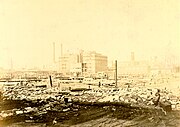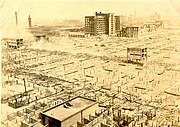
The Chicago Union Stock Yards fire of 1934 was the second-most destructive fire in the city's history, after the Great Chicago Fire of 1871, in terms of property damage and buildings lost. The Union Stock Yards of Chicago, Illinois in the United States were, at the time, the commercial butchering and meatpacking center of the Midwest. The financial cost of the fire, which began Saturday, May 19, 1934, was estimated at US$8 million (about $182 million today). Six square blocks were destroyed. One employee and thousands of animals died.
A fire station, six fire engines and a hook-and-ladder truck were among the losses. According to the Chicago Tribune, "Sirens wailed across the city, as five-sixths of Chicago's pumpers and ladder trucks raced to the stockyards. Their vacated firehouses were staffed with units sent from Blue Island, Chicago Heights, Oak Lawn, Harvey and other suburbs. With 200 Chicago police officers doing crowd control at the yards, volunteers manned their beats."
The fire was probably started by a still-lit cigarette discarded off the 43rd Street Viaduct into the straw-lined wooden cattle pens below.
-
 Stock Yards in 1933, year prior to the fire, from a Century of Progress city guidebook
Stock Yards in 1933, year prior to the fire, from a Century of Progress city guidebook
-
 Aftermath
Aftermath
-
 Aftermath
Aftermath
-
 Aftermath
Aftermath
-
 Aftermath
Aftermath
References
- ^ Grossman, Ron (6 September 2019). "Flashback: It blotted out the city from the sky: The 1934 Union Stock Yards blaze is the other great Chicago fire". Chicago Tribune. Retrieved 2022-12-21.
- ^ Gayton, Loran D. (1935). "The Chicago Stock Yards Fire, May 19, 1934". Journal (American Water Works Association). 27 (7): 803–811. doi:10.1002/j.1551-8833.1935.tb14851.x. ISSN 0003-150X. JSTOR 41226575.
- 1634–1699: McCusker, J. J. (1997). How Much Is That in Real Money? A Historical Price Index for Use as a Deflator of Money Values in the Economy of the United States: Addenda et Corrigenda (PDF). American Antiquarian Society. 1700–1799: McCusker, J. J. (1992). How Much Is That in Real Money? A Historical Price Index for Use as a Deflator of Money Values in the Economy of the United States (PDF). American Antiquarian Society. 1800–present: Federal Reserve Bank of Minneapolis. "Consumer Price Index (estimate) 1800–". Retrieved February 29, 2024.
- "Chicago's Second Greatest Fire: Union Stock Yards Fire of 1934 | Highland Park Historical Society". highlandparkhistory.com. Retrieved 2022-12-21.
External links
This Chicago-related article is a stub. You can help Misplaced Pages by expanding it. |